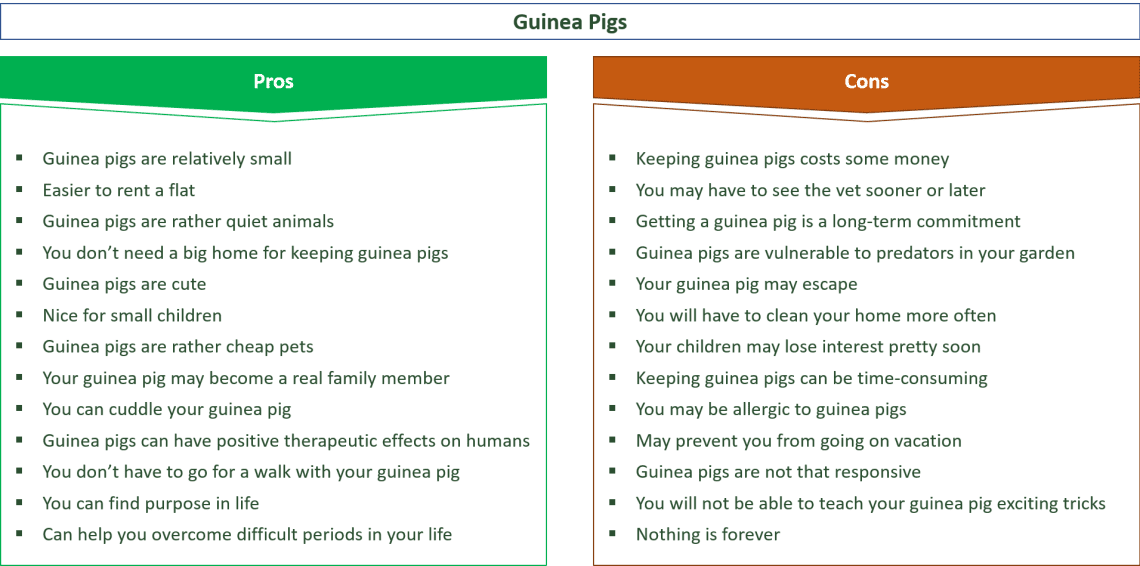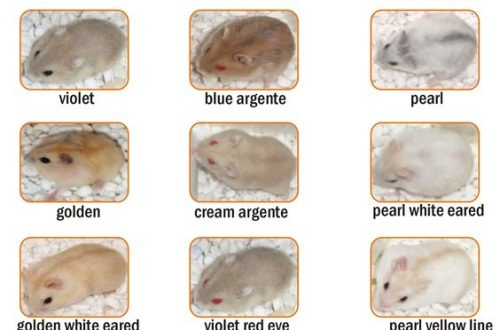
Guinea pigs at home: all the pros and cons
REMINDER TO THE BEGINNER PIG BREEDER,
or parting words from experienced pig breeders
So, at the first superficial acquaintance with guinea pigs, you had the most favorable impression of these animals, you found them charming and decided that such a pet suits you.
Before the long-awaited purchase is made, we suggest once again weighing all the pros and cons. From the moment a new tenant enters your home, you have a number of obligations to him.
IMPORTANT! From now on, you devote a significant part of your time and money to another member of your family. According to the results of a survey of members of the World of Guinea Pigs community, from 300 to 3000 rubles a month are spent on keeping two guinea pigs per month. This difference in costs is due to the owners’ place of residence, their commitment to more expensive / cheaper brands of products, and the fact that some guinea pig owners did not take into account the cost of succulent feeds (vegetables, fruits, greens) when calculating expenses.
REMINDER TO THE BEGINNER PIG BREEDER,
or parting words from experienced pig breeders
So, at the first superficial acquaintance with guinea pigs, you had the most favorable impression of these animals, you found them charming and decided that such a pet suits you.
Before the long-awaited purchase is made, we suggest once again weighing all the pros and cons. From the moment a new tenant enters your home, you have a number of obligations to him.
IMPORTANT! From now on, you devote a significant part of your time and money to another member of your family. According to the results of a survey of members of the World of Guinea Pigs community, from 300 to 3000 rubles a month are spent on keeping two guinea pigs per month. This difference in costs is due to the owners’ place of residence, their commitment to more expensive / cheaper brands of products, and the fact that some guinea pig owners did not take into account the cost of succulent feeds (vegetables, fruits, greens) when calculating expenses.
Contents
We start a guinea pig: all the pros and cons
Keeping a guinea pig as a pet has a number of advantages, however, you may encounter a number of difficulties, including the illness of the animal.
Little “buts”:
Guinea pigs are non-aggressive (rare, however, biting specimens are sometimes found among guinea pigs), but this does not mean that the animal will immediately behave friendly and trusting. By nature, they are very shy, and for a long time the animal may be wary of you.
A guinea pig quickly learns to recognize its owner, many animals quickly get used to and respond to their nickname in the future, but you should not expect intelligence and obedience from a guinea pig, an active “play” with a child, especially the execution of any commands. Guinea pigs are not endowed with the intelligence of a dog or a cat, and in many ways their behavior is rather primitive.
Guinea pigs do not lend themselves to training and get used to going to the toilet throughout the entire space of the cage, and not in the place strictly designated for this by the owner. Therefore, it is necessary to regularly (at least once a week, but preferably twice) change the bedding in the cage in order to avoid animal illness and a strong smell in the room.
Many guinea pigs are very mobile, especially during childhood. In this regard, be prepared for the fact that sawdust, hay and droppings will be constantly scattered around the cage in which your pets live. (The exception is the so-called “terrarium” cages with plastic walls instead of bars, which, by the way, are not at all suitable for guinea pigs).
The daily routine of a guinea pig, as a rule, coincides with the human one, that is, it sleeps at night and is awake during the day. But it is possible that some animals will want to stay awake at night. In addition, early in the morning, the pig may drink noisily from a hanging drinker. Therefore, if you are very susceptible to all sorts of noise, you should consider the location of the cage away from places of family recreation.
Guinea pigs are very talkative. Sometimes they behave too noisily and intrusively, demanding your attention or begging for a treat.
Guinea pigs also develop better and feel better if they have the opportunity to run freely around the room at least once a day. In doing so, you must remember:
- that pigs are rodents, and can slightly gnaw on furniture and wires near their walking area;
- can climb into hard-to-reach places;
- can stain carpets or floors with “products of their vital activity”;
- can get sick if there is a source of cold air or a draft nearby.
- that pigs are rodents, and can slightly gnaw on furniture and wires near their walking area;
Keeping a guinea pig as a pet has a number of advantages, however, you may encounter a number of difficulties, including the illness of the animal.
Little “buts”:
Guinea pigs are non-aggressive (rare, however, biting specimens are sometimes found among guinea pigs), but this does not mean that the animal will immediately behave friendly and trusting. By nature, they are very shy, and for a long time the animal may be wary of you.
A guinea pig quickly learns to recognize its owner, many animals quickly get used to and respond to their nickname in the future, but you should not expect intelligence and obedience from a guinea pig, an active “play” with a child, especially the execution of any commands. Guinea pigs are not endowed with the intelligence of a dog or a cat, and in many ways their behavior is rather primitive.
Guinea pigs do not lend themselves to training and get used to going to the toilet throughout the entire space of the cage, and not in the place strictly designated for this by the owner. Therefore, it is necessary to regularly (at least once a week, but preferably twice) change the bedding in the cage in order to avoid animal illness and a strong smell in the room.
Many guinea pigs are very mobile, especially during childhood. In this regard, be prepared for the fact that sawdust, hay and droppings will be constantly scattered around the cage in which your pets live. (The exception is the so-called “terrarium” cages with plastic walls instead of bars, which, by the way, are not at all suitable for guinea pigs).
The daily routine of a guinea pig, as a rule, coincides with the human one, that is, it sleeps at night and is awake during the day. But it is possible that some animals will want to stay awake at night. In addition, early in the morning, the pig may drink noisily from a hanging drinker. Therefore, if you are very susceptible to all sorts of noise, you should consider the location of the cage away from places of family recreation.
Guinea pigs are very talkative. Sometimes they behave too noisily and intrusively, demanding your attention or begging for a treat.
Guinea pigs also develop better and feel better if they have the opportunity to run freely around the room at least once a day. In doing so, you must remember:
- that pigs are rodents, and can slightly gnaw on furniture and wires near their walking area;
- can climb into hard-to-reach places;
- can stain carpets or floors with “products of their vital activity”;
- can get sick if there is a source of cold air or a draft nearby.
- that pigs are rodents, and can slightly gnaw on furniture and wires near their walking area;
IMPORTANT!
Some of the behaviors of your pets may disappoint you.
Preliminary
Before a new tenant appears in your house, make sure that he is provided with everything necessary for life. Prepare for him:
- A spacious cage or terrarium for rodents (for the normal life of one or two pigs, it is advisable to purchase a cage with an area of at least 50×70 cm).
- drinker;
- bowl;
- Grain specialized feed;
- Hay;
- Sawdust and/or hygienic wood filler.
IMPORTANT!
Before buying a guinea pig, prepare the cage, food, and accessories.
IMPORTANT!
Some of the behaviors of your pets may disappoint you.
Preliminary
Before a new tenant appears in your house, make sure that he is provided with everything necessary for life. Prepare for him:
- A spacious cage or terrarium for rodents (for the normal life of one or two pigs, it is advisable to purchase a cage with an area of at least 50×70 cm).
- drinker;
- bowl;
- Grain specialized feed;
- Hay;
- Sawdust and/or hygienic wood filler.
IMPORTANT!
Before buying a guinea pig, prepare the cage, food, and accessories.
Where to buy a guinea pig?
You can purchase a guinea pig from breeders or pet stores.
Today, the preferred practice is to purchase animals directly from breeders. When buying an animal in a pet store, especially in a “generalized” pet store, there is a high probability of acquiring a sick, weakened animal, a pregnant female. As a rule, the pet store does not have information about the origin and heredity of the animal.
As for breeders, in most cases, they provide optimal care for guinea pigs, as a result of which the risk of diseases and unwanted mating of young animals is reduced. If necessary, you can always get information about the parents of a young guinea pig.
In addition, most breeders are willing to keep in touch with people who have bought “pigs” from them.
If you haven’t chosen a new friend yet, check out our STORE
You can purchase a guinea pig from breeders or pet stores.
Today, the preferred practice is to purchase animals directly from breeders. When buying an animal in a pet store, especially in a “generalized” pet store, there is a high probability of acquiring a sick, weakened animal, a pregnant female. As a rule, the pet store does not have information about the origin and heredity of the animal.
As for breeders, in most cases, they provide optimal care for guinea pigs, as a result of which the risk of diseases and unwanted mating of young animals is reduced. If necessary, you can always get information about the parents of a young guinea pig.
In addition, most breeders are willing to keep in touch with people who have bought “pigs” from them.
If you haven’t chosen a new friend yet, check out our STORE
Whom to choose – a boy or a girl?
It is not recommended to have a single animal. Guinea pigs are very sensitive to lack of communication and feel bad when they are alone. If you are able to provide proper care for one animal, then buying two individuals at once will not embarrass you in any way, but you will provide the necessary living minimum for your animals and get unexpectedly great pleasure from watching their life together.
Buy animals of the same sex and the same age. Thus, you will provide your animals with good company and eliminate the possibility of unexpected offspring.
According to many guinea pig lovers, females get along better with each other. Several individuals can be kept in one cage. It should be noted that the cage for guinea pigs should be spacious enough.
With regard to the joint maintenance of males, there has not yet been a consensus among lovers of guinea pigs. Most breeders and hobbyists note that two adult males have difficulty getting along together, competing with each other. Competition often leads to a fight between males with infliction of some wounds and scratches on each other (up to gusts of ears). However, it is worth mentioning that quarrelsomeness and outbursts of aggression can often occur in an exclusively female team. Especially if the females have piglets. At the same time, in practice, cases of peaceful neighborhood of male pigs are not uncommon.
The characters of guinea pigs are very diverse, so each situation is very individual. The only advice that can be given: try to introduce animals from a very young age. In this case, they will have more chances to get along with each other.
IMPORTANT!
Guinea pigs do not tolerate loneliness well. Get a couple of same-sex animals, preferably females.
Currently, spacious cages with a partition in the middle are on sale, which ensures active communication between animals of either sex and the absence of conflicts or unwanted offspring.
Content of heterosexual animals
If you keep a female and a male and do not plan to mate, then place them in different cages or purchase a spacious cage with a partition in the middle.
It is not recommended to have a single animal. Guinea pigs are very sensitive to lack of communication and feel bad when they are alone. If you are able to provide proper care for one animal, then buying two individuals at once will not embarrass you in any way, but you will provide the necessary living minimum for your animals and get unexpectedly great pleasure from watching their life together.
Buy animals of the same sex and the same age. Thus, you will provide your animals with good company and eliminate the possibility of unexpected offspring.
According to many guinea pig lovers, females get along better with each other. Several individuals can be kept in one cage. It should be noted that the cage for guinea pigs should be spacious enough.
With regard to the joint maintenance of males, there has not yet been a consensus among lovers of guinea pigs. Most breeders and hobbyists note that two adult males have difficulty getting along together, competing with each other. Competition often leads to a fight between males with infliction of some wounds and scratches on each other (up to gusts of ears). However, it is worth mentioning that quarrelsomeness and outbursts of aggression can often occur in an exclusively female team. Especially if the females have piglets. At the same time, in practice, cases of peaceful neighborhood of male pigs are not uncommon.
The characters of guinea pigs are very diverse, so each situation is very individual. The only advice that can be given: try to introduce animals from a very young age. In this case, they will have more chances to get along with each other.
IMPORTANT!
Guinea pigs do not tolerate loneliness well. Get a couple of same-sex animals, preferably females.
Currently, spacious cages with a partition in the middle are on sale, which ensures active communication between animals of either sex and the absence of conflicts or unwanted offspring.
Content of heterosexual animals
If you keep a female and a male and do not plan to mate, then place them in different cages or purchase a spacious cage with a partition in the middle.
Breeding guinea pigs
If you still decide to get offspring from your animals:
IMPORTANT! When planning mating, think about whether you can “attach” the born cubs in the future.
If the fate of future cubs is determined, then the following must be taken into account:
- Females cannot be bred if they are more than one year old and before that they had no offspring;
- You can not knit females under the age of 5 months;
- Outbred guinea pig cubs, as well as mestizos, are less in demand than purebred animals. In this regard, it is strongly not recommended to knit outbred animals and animals of different breeds among themselves.
- you can not knit females more than two or three times a year;
- you can not knit females if they are already more than three years old;
- during or immediately after pregnancy, the female may die from toxicosis.
IMPORTANT! Never knit animals “just like that”, for fun. By doing this, you put the health of the female at risk and encourage the appearance of “poor-quality” offspring.
Quite often, fans of guinea pigs (especially beginners) experience the excitement of breeding pigs: one offspring appears after another, often without interruption. It must be remembered that by doing this you endanger the health of the giving birth pig. No matter how beautiful the little piglets are, it is necessary to stop in time and think about the health of the mother pig and the future fate of the animals born to her.
In addition, at present, there is a tendency among guinea pig lovers to constantly change their pigs, associated with a change in interests and preferences (from one breed to another, etc.) , after talking on a forum or visiting an exhibition of guinea pigs, he realizes that his pig is far from ideal. Then he gets another pig, then another, another …
Then the pig breeder comes to the conclusion that he is not able to keep so many pigs, and makes attempts to get rid of half of his herd. However, at this stage, he inevitably faces the fact that there are not so many people who want to buy his adult pigs … Therefore, it is very important for any pig breeder to stop in time and think about the future fate of his animals.
If you still decide to get offspring from your animals:
IMPORTANT! When planning mating, think about whether you can “attach” the born cubs in the future.
If the fate of future cubs is determined, then the following must be taken into account:
- Females cannot be bred if they are more than one year old and before that they had no offspring;
- You can not knit females under the age of 5 months;
- Outbred guinea pig cubs, as well as mestizos, are less in demand than purebred animals. In this regard, it is strongly not recommended to knit outbred animals and animals of different breeds among themselves.
- you can not knit females more than two or three times a year;
- you can not knit females if they are already more than three years old;
- during or immediately after pregnancy, the female may die from toxicosis.
IMPORTANT! Never knit animals “just like that”, for fun. By doing this, you put the health of the female at risk and encourage the appearance of “poor-quality” offspring.
Quite often, fans of guinea pigs (especially beginners) experience the excitement of breeding pigs: one offspring appears after another, often without interruption. It must be remembered that by doing this you endanger the health of the giving birth pig. No matter how beautiful the little piglets are, it is necessary to stop in time and think about the health of the mother pig and the future fate of the animals born to her.
In addition, at present, there is a tendency among guinea pig lovers to constantly change their pigs, associated with a change in interests and preferences (from one breed to another, etc.) , after talking on a forum or visiting an exhibition of guinea pigs, he realizes that his pig is far from ideal. Then he gets another pig, then another, another …
Then the pig breeder comes to the conclusion that he is not able to keep so many pigs, and makes attempts to get rid of half of his herd. However, at this stage, he inevitably faces the fact that there are not so many people who want to buy his adult pigs … Therefore, it is very important for any pig breeder to stop in time and think about the future fate of his animals.
VERY IMPORTANT!
The pig breeder should always REMEMBER that pig – a small defenseless living creature, for the life and fate of which the owner is directly responsible!
If you realize this, then you are the long-awaited owner – the dream of any guinea pig.
© Marina Dolinina and Ekaterina Kuznetsova
The pig breeder should always REMEMBER that pig – a small defenseless living creature, for the life and fate of which the owner is directly responsible!
If you realize this, then you are the long-awaited owner – the dream of any guinea pig.
© Marina Dolinina and Ekaterina Kuznetsova
10 Important Questions to Ask Yourself Before Buying a Guinea Pig
Despite its unpretentiousness, the guinea pig is the same pet as a dog or a cat. And it requires a certain responsibility on the part of the one who started it. Answer the following questions honestly to yourself and you will understand whether you should get a guinea pig.





